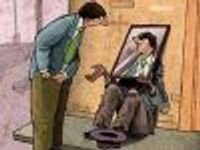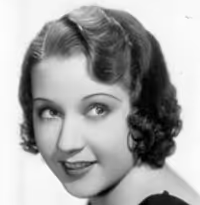Probability of a PIPPIN movie musical, post-WICKED success?
AEA AGMA SM
Broadway Legend Joined: 8/13/09
#25Probability of a PIPPIN movie musical, post-WICKED success?
Posted: 12/2/24 at 10:23pm
My dream for a Fun Home movie would blend live action with animation done in the style of Bechdel's drawings. Characters and settings dropping in and out between being animated for some scenes and live actors for others, but Bruce is always animated except for “Telephone Wire” so when Big Alison gets into the car with him what throws her really off balance is finally truly seeing him for the first time
#26Probability of a PIPPIN movie musical, post-WICKED success?
Posted: 12/3/24 at 3:56am
joevitus said: "Thanks all for the info on Weinstein. Musical Master's anecdote about Miyazaki is particularly wonderful."
It always baffles me how Weinstein seemed to feel, almost more often than not, that every foreign film needed cutting. Of course when Miyazaki signed the deal with Disney, the fact that they could not make the cuts was part of the entire deal (as a teen in the 90s I was kinda Miyazaki/Studio Ghibli obsessed and back then you could only see his films on fan traded "fansubs" as Miyazaki would not allow any official releases--though due to contract issues My Neighbor Totoro and Grave of the Fireflies did get full releases. The reasoning was because in the 80s Miyazaki had licensed the first, kinda, Ghibli film, Nausicaa for an American release and it had about 30 minutes chopped up, and was marketed as a Star Wars-esque Warriors of the Wind. So I still remember when it seemed like we simply would never get his films released in any sort of translation and the Disney deal shocked me when it happened, but giving Mononoke to their Miramax divison, and so to Weinstein, due to it being one of the more adult Ghibli films was probably a mistake and it wasn't until Disney, under the supervision of uber fan John Lasseter--yes, I know, I know--started releasing the other films under their own label that they took off. *end of rambling useless info*)
Wasn't there talk at some point--maybe back in the 90s in fact, of Pippin being an animated film (I'm not sure if a studio was mentioned--certainly not Disney. Maybe Dreamworks?) No, I'm not thinking of the planned Cats animated film (which probably wouldn't have been great given Spielberg's Amblimation output but would have been better than what we got...)
#27Probability of a PIPPIN movie musical, post-WICKED success?
Posted: 12/3/24 at 7:11am
EricMontreal22 said: "Wasn't there talk at some point--maybe back in the 90s in fact, of Pippin being an animated film (I'm not sure if a studio was mentioned--certainly not Disney. Maybe Dreamworks?) No, I'm not thinking of the planned Cats animated film (which probably wouldn't have been great given Spielberg's Amblimation output but would have been better than what we got...)"
Simon Wells, who was set to direct the animated Cats movie, was interviewed by the Kingdom of Dreams podcast a few months ago. He talked quite a bit about his memories of developing it as well as his thoughts on the live action film (@34:10).
https://www.youtube.com/watch?v=78_eu4jsqbM
#28Probability of a PIPPIN movie musical, post-WICKED success?
Posted: 12/3/24 at 11:18am
An article from earlier this year suggests (in the very last sentence) that Jake Gyllenhaal's planned Fun Home movie is still in the pipeline.
#29Probability of a PIPPIN movie musical, post-WICKED success?
Posted: 12/3/24 at 7:04pm
kdogg36 said: "An article from earlier this year suggests (in the very last sentence) that Jake Gyllenhaal's plannedFun Homemovie is still in the pipeline."
Well, that's exciting news!
As for PIPPIN, this was Weinstein's personal baby, as it was the first show he saw, or something like that. A draft had been turned in and he was pushing for another when I last heard. That was back in 2017 and long before #MeToo and the indictments.
I doubt it.
#30Probability of a PIPPIN movie musical, post-WICKED success?
Posted: 12/3/24 at 7:25pm
I saw the original Pippin at the Imperial at 19 and have a soft spot for its mutability; it adapts to directorial vision and theatrical conceit. A charming high school production convinced me. But as a rewatch of Fosse/Verdon also reminded me, it’s trapped with a schematic and episodic book - Fosse knew and minimized it - and depends on actual live magic to take flight. Because it’s cinematic doesn’t mean it will make a good film. Its existential search - born of Vietnam and leftover 60s domestic upheaval - seems too fragile to hold a movie together in Trump 2.0 America. A lost adolescent ain’t the fiery Elphaba. And another Nine we don’t need.
#31Probability of a PIPPIN movie musical, post-WICKED success?
Posted: 12/3/24 at 8:36pm
Auggie27 said: "I saw the original Pippin at the Imperial at 19 and have a soft spot for its mutability; it adapts to directorial vision and theatrical conceit. A charming high school production convincedme. But as a rewatch of Fosse/Verdonalso reminded me, it’s trapped with a schematic and episodic book - Fosse knew and minimizedit - and depends on actual live magic to take flight. Because it’s cinematic doesn’t mean it will make a good film. Its existential search - born of Vietnam and leftover 60sdomestic upheaval - seems too fragile to hold a movie together in Trump 2.0 America. A lost adolescent ain’t the fiery Elphaba. And anotherNine we don’t need."
That's a good point. To become a big (or even medium) budget movie right now, I think a studio would feel the need to make a number of changes (a musical about a white straight guy trying to find his place?) that I'm not sure the show could support...
(I did recently come across a Schwartz interview when the last London revival was done--five years back?--where he went on about a brilliant treatment for Pippin that he'd been given but he wasn't allowed to say anything more. But... I mean, we know that that ultimately means very little.)
Voter
Understudy Joined: 5/19/20
#32Probability of a PIPPIN movie musical, post-WICKED success?
Posted: 12/4/24 at 1:59am
Well, now I need Kit Connor as Pippin.
I don't disagree that it'd be a hard sell as a movie. There's also very few directors I'd want to see tackle it. Chu is not one of them.
Ken Russell would've made a cool Pippin. Spielberg I'd let do any musical after WSS. Terry Gilliam perhaps? Burton? Del Toro's Pippin would be nuts. Gerwig could probably pull it off. It'd be good to get someone with a sense of whimsy and danger. I'd also love to see someone bring out the earthy, 60s quality of it with scrappy filmmaking, lots of medium-wide face-on takes, handheld cameras, and panning.
#33Probability of a PIPPIN movie musical, post-WICKED success?
Posted: 12/4/24 at 7:57am
If I were to choose another Schwartz musical to adapt I'd go for The Baker's Wife. It was adapted from a movie so it should fit the medium, the best parts of the musical are the generally intimate solo numbers which lend themselves well to film and maybe the adaptation could be an excuse to either trim the ensemble numbers or give them some depth and energy with the editing. On the other it has zero name recognition and adultery is not that interesting of a topic nowadays. I could see as a Netflix smaller prestige-ish film a la Tick Tick Boom with liked actors.
The other candidate would be Children of Eden, if only because it will never get to Broadway as Schwartz insists on keeping both choirs and it is too massive. It is also his most similar to Wicked score, more commercial and based on biblical stories everyone knows. I'm not sure the presentational / story-theatre side of it lends that well to a film but too me it seemed like such an obvious choice for an Easter or Christmas LIVE tv musical that I was shocked it was never suggested back when those were popular some years ago.
I struggle to see how Pippin would gain anything from the adaptation. However, I wish they would remaster and release the Fosse Cut of the Toronto taping.
Owen22
Broadway Legend Joined: 2/24/11
#34Probability of a PIPPIN movie musical, post-WICKED success?
Posted: 12/4/24 at 8:16am
Kad said: "I think Wicked's success helps make a Hamilton movie happen more than anything else."
It actually made me think a Book of Mormon movie now might happen.
Owen22
Broadway Legend Joined: 2/24/11
#35Probability of a PIPPIN movie musical, post-WICKED success?
Posted: 12/4/24 at 8:19am
Elibal said: "If I were to choose another Schwartz musical to adapt I'd go for The Baker's Wife. It was adapted from a movie so it should fit the medium, the best parts of the musical are the generally intimate solo numbers which lend themselves well to film and maybe the adaptation could be an excuse to either trim the ensemble numbers or give them some depth and energy with the editing. On the other it has zero name recognition and adultery is not that interesting of a topic nowadays. I could see as a Netflix smaller prestige-ish film a la Tick Tick Boom with liked actors."
The Baker's Wife is such a trifle story it would need mega-expanding to be a satisfying film.
#36Probability of a PIPPIN movie musical, post-WICKED success?
Posted: 12/4/24 at 12:31pm
...you do know The Baker's Wife is based on a movie, right? Wasn't a trifle for late Thirties/early Forties French cinema. Even won a couple of major awards.
Now, as to the topic of the thread -- Pippin as a movie? I don't personally think it would work, it's very stage-bound. I know Fosse was indifferent to the very idea (having been burned by his experience on Sweet Charity and not especially wanting to relive other of his Broadway catalogue on the silver screen), but the producer, Stuart Ostrow, couldn't let go of the notion. Kevin Winkler's Big Deal includes excerpts from a memo titled "PIPPIN Motion Picture Impressions" where he took the notion of "a boy searching the world over for fulfillment" and opened it up by going all Godspell on it, setting each sequence in a different, instantly recognizable theatrical venue: "Magic to Do" at the Acropolis or Stonehenge, the "War" sequence everywhere from the Roman Coliseum to Bob Hope's USO tours to onstage at the Palace, Pippin's introduction to sex in Vegas and at the Crazy Horse Saloon in Paris, his life with Catherine and Theo played out on an "Andy Hardy street" on a Hollywood soundstage evoking old movie images, etc. (Frankly, it sounds like Michael Sarne tripped over this treatment when he was trying to decipher Myra Breckinridge.)
That said, I think Ostrow's film ideas, which in some ways eerily presage what Bill Condon and Rob Marshall did with Chicago 30 years later, indicate he had somewhat disconnected from what property was in his hands by the time Bob had filled it with tits and glitz and feathers glued together with darkness. If it was just a boy searching for fulfillment and settling for what he could achieve, he might as well have gotten somebody with a visual sensibility to guide Hal Prince through sticking his Candide on screen.
Especially by the time Fosse had had his way with it, Pippin is "Unreliable Narrator: The Musical." He's a college grad who's given up trying to find himself in a morally and emotionally barren landscape, and his finger is on the trigger. He is considering what led him to the point of no return through the lens of cognitive distortion. To quote Stephen Schwartz, "...the way to think about the Players is to realize that they are actually in Pippin's head, just as we all have those internalized voices that tell us we're not good enough, rich enough, beautiful enough, etc., and that we have to make our goals conform to the shallow and misplaced goals we see touted by the media and our so-called societal leaders. The Players are not so much malevolent as they are eternally cynical and dissatisfied, because nothing in real life can be glamorous enough or spectacular enough to achieve the sort of romanticized perfection we carry in the movie in our heads."
The whole show is Pippin's fever dream, a hallucination full of the magic he never found in his life, all happening in the moment before he kills himself. He's his own tormentor, revving himself up to take the final step. There's a reason his family is populated by perverse stereotypes, his fantasies filled with frightening characters of his own creation. The spectacle is symbolic of what Pippin is building "extraordinary" up to be in his head, of what he thinks he must achieve.
The Players greet his straightforward heartfelt anthem of individuality and drive, "Corner of the Sky," with sarcastic applause, muted laughter, and rolling eyes... of course they do! When you're getting ready to shuffle off the mortal coil, you'll see that earlier version of you, so confident, so youthful, as immature, self-involved, clueless, cocky, too-earnest, with zero self-awareness. "If you knew then what you know now..."
If you're laughing knowingly at "Extraordinary," then your own inner Players are talking: "Extraordinary, huh? Hey, genius, you don't become extraordinary just because you say you are! Based on the evidence so far, not only do you not seem extraordinary, it's doubtful you ever will be!"
In this dark night of the soul, he sees himself as failing at everything he's tried in life. Trying to live up to his father's expectations didn't work; losing himself in sex didn't work; trying to do better than his father didn't work; he initially fails to realize that stepping up for Catherine and Theo did work because he doesn't think just getting through the day-to-day can possibly be enough.
But he learns what we do: yes, we face disillusionment in life. Yes, we make compromises. Everybody feels trapped in their lives to some degree. But those compromises can provide us with a sense of peace, even joy. So he'll never be a great soldier, or lead a carefree life, or be a successful politician, or succeed at anything, really, except an average life. Maybe that's all he really needs. Is it happily ever after? Who knows? But whether it's "extraordinary" or not, he now has that meaning in his life that he wanted. He has someone, something, to live for. (If only he could protect his (now-)son from the same journey...)
Does every generation have to go through it? It might, as long as we create outrageous expectations for our young people and then sabotage their chances at attaining them, increasingly asking them to grow up faster at an alarming rate, rarely offering them role models and destroying the ones they have, lying to them about how they can have anything they want. (And we wonder why murder and suicide among teenagers continues to increase, and where that "entitlement" comes from.)
To some, when everything else is trashed, all that's left is the Grand Finale. But that doesn't have to be the case. You don't have to do extraordinary things to be extraordinary. You don't have to reach the highest high to be worth something. Sometimes succeeding at average, ordinary, everyday life is enough. And you don't have to follow all the rules and get everything "right" to do that. That's what Pippin is about. That's what it means.
Broadway Legend
joined: 5/1/05
Blocked: After Eight, suestorm, david_fick, emlodik, lovebwy, Dave28282, joevitus, BorisTomashevsky, Seb28
#37Probability of a PIPPIN movie musical, post-WICKED success?
Posted: 12/4/24 at 1:28pm
Auggie27 said: "t’s trapped with a schematic and episodic book - Fosse knew and minimizedit "
Uh, no, Fosse exacerbated it because he had no respect for the material. He made the Lead Player and the acting troupe the main characters and reduced Pippin to a bland, essentially characterless generic seeker. None of the character development the writers wanted was there, nor was the focus on character, against their wishes. Schwartz has been lamenting this from before the show even opened. Fosse's work is exciting, and his version is likely the best (since the book as he insisted on being realized has never been revised, so everyone else is working mostly within the structure he organized), but it's on his shoulders rather than the credited authors (Schwartz and book writer Roger O. Hirson) that the show lacks substance.
#38Probability of a PIPPIN movie musical, post-WICKED success?
Posted: 12/4/24 at 2:38pm
Voter said: "Spielberg I'd let do any musical after WSS. "
Has Speilberg ever done anything that would require the element of stylized surrealism Pippin would probably need?
#39Probability of a PIPPIN movie musical, post-WICKED success?
Posted: 12/4/24 at 2:42pm
Elibal said: "II struggle to see how Pippin would gain anything from the adaptation. However, I wish they would remaster and release the Fosse Cut of the Toronto taping."
Considering that it wasn't until last year that Kathryn Doby (who was in charge of restaging Pippin for that filming) even had any idea the 20 cut minutes from that Pippin filming existed--I know for a fact from personal correspondence--that some of us (*waves to GDLGI*) have known about for years and years now, I can't imagine anything being done with it (or if those work print videos, which seem all that exist, can really be remastered all that well) but I would be down for some sort of official release.
#40Probability of a PIPPIN movie musical, post-WICKED success?
Posted: 12/4/24 at 2:45pm
joevitus said: "Auggie27 said: "t’s trapped with a schematic and episodic book - Fosse knew and minimizedit "
Uh, no, Fosse exacerbated it because he had no respect for the material. He made the Lead Player and the acting troupe the main characters and reduced Pippin to a bland, essentially characterless generic seeker. None of the character development the writers wanted was there, nor was the focus on character, against their wishes. Schwartz has been lamenting this from before the show even opened. Fosse's work is exciting, and his version is likely the best (since the book as he insisted on being realized has never been revised, soeveryone else is working mostly within the structurehe organized), but it's on his shoulders rather than the credited authors (Schwartz and book writer Roger O. Hirson) that the show lacks substance.
"
You're point is valid--but I don't think it was like Pippin was a deeply written character and Fosse just picked away at that and made him bland Even in the early drafts out there, he always was--which is always a problem with these types of stories (at least in Candide, Candide's naivity as he tries fo find meaning in life is done with humour.)
#41Probability of a PIPPIN movie musical, post-WICKED success?
Posted: 12/4/24 at 2:51pm
Owen22 said: "Elibal said: "If I were to choose another Schwartz musical to adapt I'd go for The Baker's Wife. It was adapted from a movie so it should fit the medium, the best parts of the musical are the generally intimate solo numbers which lend themselves well to film and maybe the adaptation could be an excuse to either trim the ensemble numbers or give them some depth and energy with the editing. On the other it has zero name recognition and adultery is not that interesting of a topic nowadays. I could see as a Netflix smaller prestige-ish film a la Tick Tick Boom with liked actors."
The Baker's Wife is such a trifle story it would need mega-expanding to be a satisfying film."
In the liner notes for the London/Trevor Nunn production's cast album, Nunn says that maybe it would work best as a small-scale, intimate TV musical. And I think he might be right. Yes, I know, Schwartz and Stein felt that they had to follow the film closer and focus more on the townspeople and the town itself in all their revisions--because that's what makes the film so great. The problem is, all of that material, while not all out bad, is second tier Schwartz, whereas the stuff for the leads, plus Chanson, (essentially everything that made it on the first "with members from the original cast" recording) is top tier Schwartz. So maybe a small scale cable tv adaptation focusing primarily on those characters, and running under 90 minutes, would work best--though I doubt Schwartz would go for it now (don't get me started on his insistance that Endless Delights never be used again which I think is pretty important--are we not meant to get any sense of why exactly Genevieve has left Aimable?)
Baker's Wife has some incredible music, but there are insurmountable problems with just its construction. Would I pull a David Merrick and cut Meadowlark? No way! But because of where the song is placed in the show, because the song is so very long and epic, it sets the audiences up to think that Genevieve is the main character and that we'll be following *her* story when really... we don't. She is barely even on stage in Act II (less so now without Endless Delights...)
Voter
Understudy Joined: 5/19/20
#42Probability of a PIPPIN movie musical, post-WICKED success?
Posted: 12/4/24 at 2:59pm
EricMontreal22 said: "Voter said: "Spielberg I'd let do any musical after WSS. "
Has Speilberg ever done anything that would require the element of stylized surrealism Pippin would probably need?
"
Spielberg has dabbled in just about every genre. Not quite "surrealism", but he also had never done a musical either. He's done plenty of fantasy and scifi though. He'd certainly be up to the task.
#43Probability of a PIPPIN movie musical, post-WICKED success?
Posted: 12/4/24 at 3:28pm
Voter said: "EricMontreal22 said: "Voter said: "Spielberg I'd let do any musical after WSS. "
Has Speilberg ever done anything that would require the element of stylized surrealism Pippin would probably need?
"
Spielberg has dabbled in just about every genre. Not quite "surrealism", but he also had never done a musical either.He's done plenty of fantasy and scifi though. He'd certainly be up to the task."
I'm a Spielberg fan, for the most part, but I just don;'t see Pippin playing into any of his strengths. Then again I thought WSS was just decently *good*--I still resent it from changing a dance musical, with dance being the main story telling engine of the piece, to a very talky book musical--do I think it added to our understanding of the musical to know that Tony had been in prison? I do not! But maybe that's more on Kushner, although Spielberg obviously wanted that change in focus.
#44Probability of a PIPPIN movie musical, post-WICKED success?
Posted: 12/4/24 at 3:34pm
You know, Eric, the mild expansion required for a TV movie of the week type adaptation of The Baker's Wife might be the only situation where Schwartz would be persuaded to restore "Endless Delights." After all, back in the Stephen Daldry period, he almost put "Making Good" (precursor to "The Wizard and I") back in the Wicked movie...
Broadway Legend
joined: 5/1/05
Blocked: After Eight, suestorm, david_fick, emlodik, lovebwy, Dave28282, joevitus, BorisTomashevsky, Seb28
#45Probability of a PIPPIN movie musical, post-WICKED success?
Posted: 12/4/24 at 3:47pm
g.d.e.l.g.i. said: "You know, Eric, the mild expansion required for a TV movie of the week type adaptation of The Baker's Wife might be the only situation where Schwartz would be persuaded to restore "Endless Delights." After all, back in the Stephen Daldry period, he almost put "Making Good" (precursor to "The Wizard and I") back in the Wicked movie..."
WOW, *that* I didn't know. Do you know if they planned on having both it and Wizard and I?
#46Probability of a PIPPIN movie musical, post-WICKED success?
Posted: 12/4/24 at 4:32pm
Elibal said: "If I were to choose another Schwartz musical to adapt I'd go for The Baker's Wife. It was adapted from a movie so it should fit the medium, the best parts of the musical are the generally intimate solo numbers which lend themselves well to film and maybe the adaptation could be an excuse to either trim the ensemble numbers or give them some depth and energy with the editing. On the other it has zero name recognition and adultery is not that interesting of a topic nowadays. I could see as a Netflix smaller prestige-ish film a la Tick Tick Boom with liked actors.
The other candidate would be Children of Eden, if only because it will never get to Broadway as Schwartz insists on keeping both choirs and it is too massive. It is also his most similar to Wicked score, more commercial and based on biblical stories everyone knows. I'm not sure the presentational / story-theatre side of it lends that well to a film but too me it seemed like such an obvious choice for an Easter or Christmas LIVE tv musical that I was shocked it was never suggested back when those were popular some years ago.
I struggle to see how Pippin would gain anything from the adaptation. However, I wish they would remaster and release the Fosse Cut of the Toronto taping."
Agreed, but it's wonderful just to have the whole thing available now, even with the poor quality of the restored material. I just found it on YouTube a few days ago and enjoyed it immensely--much more then when I watched the let's go ahead and say mutilated version that was released on VHS/DVD.
Katt is a little long in the tooth for the role, but Vereen is amazing and the rest of the supporting cast is good. Only Leslie Denniston is kinda weak. There's nothing technically wrong with her, but I think back to the dispute Schwartz had with Fosse over casting Jill Clayburgh. Schwartz wanted a stronger singer, but Fosse said she had movie star quality (good call, Bob) and that a character introduced that late in the action needed to be played by an actor who really caught the audience's attention. Denniston just...doesn't. She's pretty, she has a lovely voice (so happy to see her rendition of "I Guess I'll Miss the Man"), he acting is fine...just she's kinda an anonymously talented performer. Capable but forgettable.
Geraldo57
Swing Joined: 8/23/22
#47Probability of a PIPPIN movie musical, post-WICKED success?
Posted: 12/4/24 at 4:41pm
Cats? If only Sidney Poitier had filmed that version of Cats with Stockard Channing and Donald Sutherland as extras!
#48Probability of a PIPPIN movie musical, post-WICKED success?
Posted: 12/4/24 at 4:42pm
EricMontreal22 said: "joevitus said: "Auggie27 said: "t’s trapped with a schematic and episodic book - Fosse knew and minimizedit "
Uh, no, Fosse exacerbated it because he had no respect for the material. He made the Lead Player and the acting troupe the main characters and reduced Pippin to a bland, essentially characterless generic seeker. None of the character development the writers wanted was there, nor was the focus on character, against their wishes. Schwartz has been lamenting this from before the show even opened. Fosse's work is exciting, and his version is likely the best (since the book as he insisted on being realized has never been revised, soeveryone else is working mostly within the structurehe organized), but it's on his shoulders rather than the credited authors (Schwartz and book writer Roger O. Hirson) that the show lacks substance.
"
You're point is valid--but I don't think it was like Pippin was a deeply written character and Fosse just picked away at that and made him bland Even in the early drafts out there, he always was--which is always a problem with these types of stories (at least in Candide, Candide's naivity as he tries fo find meaning in life is done with humour.)"
You make a good point about the basic material and its episodic nature. Although the original Pippin John Rubenstein has talked about how Fosse undermined the character in the staging and in script revisions. Still, it's also easy for me to romanticize a show that never was and to assume it would have qualities the show we have doesn't. Who knows?
#49Probability of a PIPPIN movie musical, post-WICKED success?
Posted: 12/4/24 at 5:01pm
EricMontreal22 said: "WOW, *that* I didn't know. Do you know if they planned on having both it and Wizard and I?"
He didn't say one way or the other, but I remember reading it in a news story here, so the bare fact of considering reintroducing the song has to be buried somewhere among the news pages.
Broadway Legend
joined: 5/1/05
Blocked: After Eight, suestorm, david_fick, emlodik, lovebwy, Dave28282, joevitus, BorisTomashevsky, Seb28
Videos









